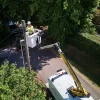Rock and a Hard Place as Openreach Criticised for Limited FTTP Rollout
Openreach’s accelerated “Fibre First” plan to deploy FTTP “ultrafast broadband” to 3 million UK premises by 2020 (here) has allegedly left the Government “extremely frustrated,” so much so that they are rumoured to be revisiting the option of completely splitting BT’s network access division.
At present the operator expects to bring “ultrafast broadband” (100Mbps+) capable connections to 13 million premises by the end of 2020, which it will deliver through a mix of cheaper but slower hybrid fibre technology (i.e. G.fast to 10 million premises) and more expensive but Gigabit capable Fibre-to-the-Premises lines (i.e. FTTP to 3 million premises; until 1st Feb 2018 they only had solid plans for 2 million).
Openreach also aspires to push FTTP out to 10 million premises but the seeming lack of a solid commitment to deliver this appears to be causing frustration within the Government. As one Westminster source told The Telegraph this weekend: “Lots of investors are now seeing the potential of full fibre. BT and Openreach have more to gain than most but are not investing properly. We need to look at why.” Ofcom have also been piling the pressure on, with CEO Sharon White accusing the operator of “complacency” by not investing more.
Advertisement
The Government aren’t wrong, plenty of smaller alternative network (AltNet) ISPs have made similar plans. For example, Hyperoptic aim to cover 2 million urban premises by 2022 (aspiration for 5 million by 2025), while Vodafone / Cityfibre will reach 1 million by 2021 (aspiration for up to 5 million by 2025) and Virgin Media also aim to reach 2 million by around 2019 or 2020. Not to mention all of the work by smaller operators.
On the other hand many of Openreach’s smaller rivals aren’t bogged down by the heavy weight of historic regulation, not to mention some issues with BT’s risk averse shareholders, as well as several rivals demanding cheaper FTTC broadband (makes it harder to sell an investment case for FTTP), plus on-going problems with debt and a growing pension deficit.
Openreach has previously warned (here) that reaching 10 million premises (costing £3bn to £6bn) may only be possible with co-investment support from other ISPs (difficult since so many are now doing their own thing), as well as softer regulation, reduced logistical barriers (improved planning etc.) and the ability to switch-off old copper networks as areas move to FTTP (expensive and complex, while also requiring support from Sky Broadband and TalkTalk etc.).
A Spokesperson for BT said:
“Our 900,000 investors need certainty and stability about how we are regulated. We are therefore working very closely with the government and the regulator to create the conditions to ensure that investment can be pursued.””
The challenge here is with the difficulty of marrying the industry’s many competing interests and turning that into some sort of workable agreement, which is essential in order to avoid future legal and competition disputes. However, BT’s rivals are increasingly deciding to do their own FTTP rather than sacrifice to the incumbent, which could reduce the possibility of a co-investment solution and disrupt Openreach’s efforts.
Advertisement
Equally there may be something to be said for allowing AltNets some time to grow their own networks first, without fear of maximum competitive pressure being applied in the same areas by Openreach. Lest we forget that Ofcom’s recent Strategic Review (here), which agreed the “legal separation” of Openreach from BT, was partly designed to help encourage the growth of “full fibre” AltNets and that’s precisely what we’re seeing.
A Spokesperson for the DCMS (Government) said:
“The legal separation of BT and Openreach is helping to bring certainty for the sector and better broadband to consumers, and we’ve always been clear that we expect to see significant improvements to services and increased investment in the country’s digital infrastructure. Full fibre connectivity will be vital in building a Britain that’s fit for the future, so it was good to hear Openreach announce a move away from reliance on copper.”
In our view Openreach’s “Fibre First” commitment suggests that they’re already heading toward a deployment that will almost certainly end up extending well beyond 3 million premises by 2025, although they’re clearly hoping for some more regulatory flexibility before signing off on the details and committing to a bigger figure.
Meanwhile it remains unclear how much of a difference full separation of Openreach would actually make vs the current legal separation, particularly since most of today’s largest investment strategies are only focused upon reaching the more economically viable urban areas. Any future strategy for tackling the other half of the UK, particularly rural areas, would undoubtedly still require billions in state aid; irrespective of Openreach’s status.
Full fibre is ultimately a technology that may take a couple of decades to rollout and we’re only just starting down that path. Nevertheless with so many recent announcements around FTTP it’s beginning to feel like the market is changing faster than either regulation or Openreach can keep pace with.
Advertisement
On the other hand we’ve already had one Strategic Review last year and there’s now something to be said for allowing natural competition to grow itself over the next few years, which requires stability.
Mark is a professional technology writer, IT consultant and computer engineer from Dorset (England), he also founded ISPreview in 1999 and enjoys analysing the latest telecoms and broadband developments. Find me on X (Twitter), Mastodon, Facebook, BlueSky, Threads.net and Linkedin.
« KCOM See Full Fibre Broadband Surpass Copper on Hull UK Network

















































Comments are closed